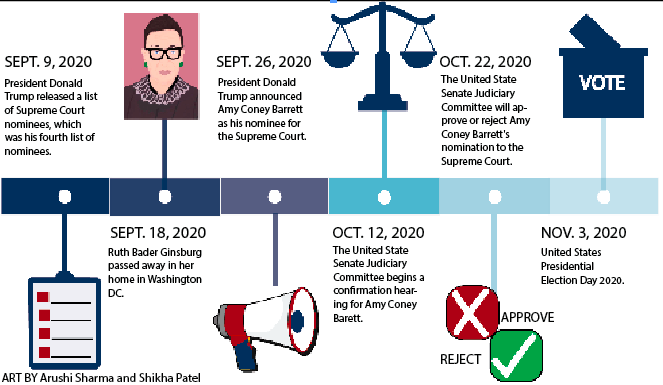Ginsburg’s death leads to uncertain SCOTUS future
Nation faces another Supreme Court controversy leading up to a Presidential election
Arushi Sharma and Shikha Patel
On Friday, Sept. 18, 2020, at the age of 87, Associate Justice Ruth Bader Ginsburg passed away in her home due to complications from metastatic pancreatic cancer. Throughout her time serving on the Supreme Court of the United States (SCOTUS), Ruth Bader Ginsburg was called the “Notorious RBG” due to her continual fight for equality for all.
November 3, 2020
On Friday, Sept. 18, 2020, at the age of 87, Associate Justice Ruth Bader Ginsburg passed away in her home due to complications from metastatic pancreatic cancer. Throughout her time serving on the Supreme Court of the United States (SCOTUS), Ruth Bader Ginsburg was called the “Notorious RBG” due to her continual fight for equality for all.
Many people believe that Ginsburg’s death was a loss felt throughout the nation; people mourned the loss of a woman that many consider a feminist icon and the loss of a progressive seat on the Supreme Court to one segment of the population, but not to another.
“I believe Ginsburg’s story has inspired millions of people and will continue to inspire millions after her death,” geography teacher Dalton Pool said.
Some people who are active in the government system are concerned about the impact of Ginsburg’s death on the country, including junior Paulina Clark who is concerned about the reality of America’s future.
“My initial reaction was taken aback, and I was in disbelief at what this could mean for me and the people affected,” Clark said. “I believe that Ginsburg’s death has instilled fear into the minds of women and the LGBTQ+ community, as we face the risk of rulings that benefit us being overturned.”
Ginsburg was elected to the SCOTUS in 1993 by former President Bill Clinton. She served for 27 years, delivering progressive votes on several social issues such as abortion rights, same-sex marriage,immigration,and healthcare.
“Ginsburg was a hero to people, but her legacy is going to be important,” history teacher Charles Stampley said. “I hope her death is a reminder of the rights that she fought for, especially women’s rights and retired life.”
Ginsburg’s death, which occurred less than seven weeks before the Presidential Election, stirred up conflict between the Democratic and Republican parties. The Constitution states that the current President of the United States must present a nominee for any openings in the Supreme Court; however, in this scenario, some people disagree and want to wait until the upcoming election is over to appoint a new Supreme Court Justice. Sophomore James Dick believes that the nomination process should not wait until after the election, just because Ginsburg passed away.
“I think the law makes no exceptions, not even for the exceptional,” Dick said. “Even if Biden wins, he will not be sworn in until January, and Trump would still have the right to nominate a justice.”
Clark has a different opinion on when the Supreme Court Justice should be elected.
“The nomination should occur after the election,” Clark said. “Before the last election, the nomination was postponed by Lindsey Graham, as he wasn’t in favor of Obama’s decision. [Graham] said that he would hold the same stance if that situation should occur again, but now he is refusing to honor his promise.”
Because The Constitution states that the current president nominates the next Supreme Court Justice, Dick believes that postponing the nomination until after the election is unjust.
“Postponing it until after the election would be unconstitutional and frankly shocking that people decide it’s okay to just undermine the president,” Dick said.
Nine days before Ginsburg’s death, President Donald Trump released a list of potential people to take her place in the Supreme Court. This list included Republican Senator Ted Cruz of Texas, Tom Cotton of Arkansas, Christopher Landau, and several others.
“Every one of these individuals will ensure equal justice, equal treatment and equal rights for citizens of every race, color, religion and creed,” Trump said in his announcement about his list of potential people to take Ginsburg’s place in the Supreme Court.
Because the current SCOTUS Justices are divided between five conservatives and three liberals after Ginsburg’s death, her replacement is extremely important for both the Democratic and Republican parties.
“If Democrats take back control of the Senate and the Presidency, I would not be surprised if they attempt to change the number of justices who serve on the court,” Pool said.
In contrast, Stampley believes that the number of liberals compared to conservatives will not have as large of an impact as some are implying.
“If a conservative is elected, it’s not going to be the end of the world immediately, and at the same time for the conservatives, it’s not an instant win,” Stampley said. “There is going to be no doubt a rightward shift to the courts over the next couple of decades.”
On Saturday, Sept. 26, Trump officially announced Judge Amy Coney Barrett as his nominee for the Associate Justice of the Supreme Court. Barrett worked as a professor of law at the University of Notre Dame for 15 years. Then, Barrett became a clerk for both late Justice Antonin Scalia and Judge Laurence Silberman each for a year.
“I know that Barrett is very religiously oriented and is pro-life, which is dangerous for our democracy as it violates the right of the separation of church and state,” Clark said.
With the nomination of Barrett, people have mixed opinions about how much of an impact she will have on the Supreme Court if she were to be confirmed.
“I think there is a chance that the new Supreme Court Justice might affect several decisions, and a chance she might not,” Dick said. “One Justice out of nine might not have the huge impact some expect, or maybe Barrett will be super passionate and dedicated to such issues.” Because a Supreme Court Justice is elected for their entire life and there are several current issues that need to be decided by the Supreme Court, junior Elena Martinez believes that the next Supreme Court Justice will have a huge impact on important issues that our country currently faces.
“If Barrett is elected, there will be a conservative majority on the court, which could affect important legal decisions and the rights of Americans for years to come,” Martinez said. “Issues dealing with gun control, health care, criminal justice reform, LGBTQ+ rights, abortion rights and climate change will be in danger of being weakened or eliminated altogether.”
Aside from the debate of Barrett’s qualifications, many fear that her political views will have impacts on issues such as abortion, including the Roe v. Wade case, on the Supreme Court.
“If the Supreme Court did overturn Roe v. Wade, we would most likely see conservative states pass stricter abortion laws,” Pool said. “Liberal states would most likely keep the laws they already have on the books.”
While Dick believes that nothing is changing, Martinez passionately feels that there will be a change in the healthcare system.
“Trump has already made it clear that he wants to overturn Obamacare,” Martinez said. “A conservative court would most likely be in favor of that because of the guarantee to cover people with preexisting conditions, saying that this mandate would be unconstitutional.”
Even though three Republicans, including President Trump, tested positive for COVID-19 on Saturday, Oct. 3, the Senate Judiciary Committee hearings began on Monday, Oct. 12 to consider the nomination of Judge Barrett. Pool believes that this hearing won’t have a large impact on the country as a whole.
“The impact on Bowie depends more on what our state leaders do and less on what the Supreme Court does,” Pool said. “The Supreme Court determines if laws are constitutional or unconstitutional; a Conservative Supreme Court allows conservative leaders to pass conservative laws.”
On Sunday, Oct. 22, the Senate Judiciary Committee will vote to send the decision to the full Senate. While justices are currently confirmed for life terms, Stampley believes that there should be a change to The Constitution to limit the time a justice serves.
“I would like to see term limits on the Supreme Court to where we don’t have this vicious mud fight every time [a Supreme Court Justice] is replaced,” Stampley said.
Although there are opposing beliefs on when Supreme Court openings should be filled, the Barrett confirmation hearings are ongoing. In terms of what this decision and other future decisions mean for the country’s future, Martinez believes that our country needs to come together and accept the changes that occur.
“Letting go of past prejudices is something that this country can’t seem to do,” Martinez said. “In order for us to move forward into a future where our citizens are happy, healthy, and safe, we must not reject progressive changes.”










